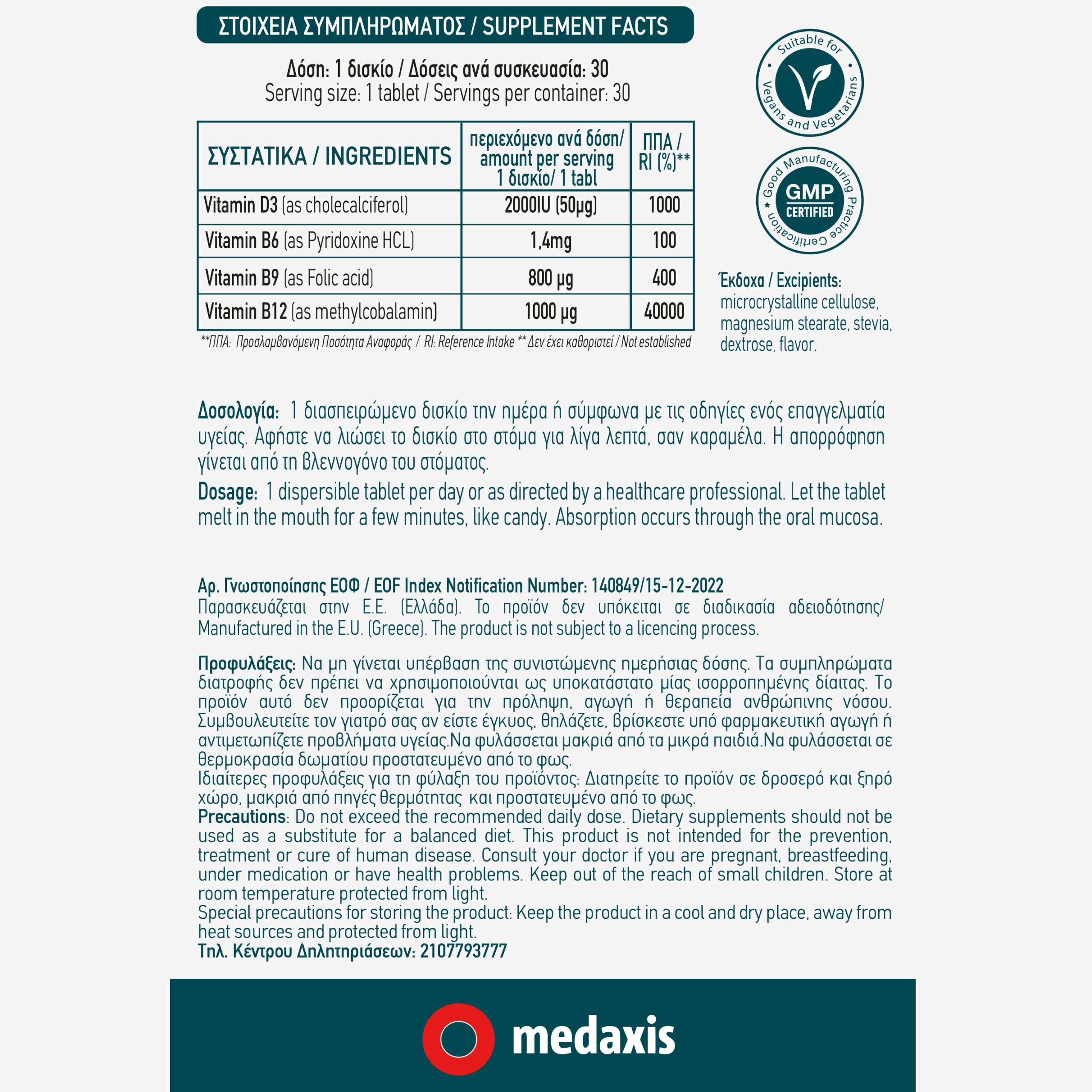Elevate
Vitamin D3
to maintain normal bones and muscle condition and the normal function of the immune system
Vitamin D3 contributes to the normal absorption of calcium and phosphorus, to the maintenance of the normal condition of bones, muscle and teeth.
It plays a role in the process of cell division.
Vitamin D3 contributes:
- in maintaining normal levels of calcium in the blood,
- in maintaining normal muscle function and
- in maintaining normal immune system function.
Lack or deficiency of vitamin D is associated with:
- Osteoporosis in adults.
- Disorders of nervous and muscular function.
- Disorders of the immune system (predisposition to infections).
- Predisposition to cancer.
- Predisposition to hypertension and cardiovascular disease
- Disorders of glucose metabolism (predisposition to metabolic syndrome and diabetes mellitus).
- Predisposition to Alzheimer’s and epilepsy.
- Predisposition to severe skin diseases, such as scleroderma, vitiligo, systemic lupus erythematosus-SLE and psoriasis.
- Predisposition to rheumatoid arthritis, muscle atrophy.
- Predisposition to Multiple Sclerosis (Multiple Sclerosis.)
- Predisposition to Asthma, Chronic Obstructive Pulmonary Disease, Cystic Fibrosis
Skeletal Disease
Vitamin D promotes the absorption of calcium in the intestine and keeps its levels in the blood stable, preventing hypocalcemia. Vitamin D deficiency leads to secondary hyperparathyroidism which causes increased bone loss, osteopenia, osteomalacia, osteoporosis and increased risk of fracture.
Immune System
Vitamin D supplements protect people from pneumonia, the flu and/or the common cold. This is the most convincing scientific evidence to date that vitamin D, in addition to being vital for bone and muscle health, also strengthens the immune system. Vitamin D supplementation was found to prevent 1/33 (that’s about three in a hundred-3%) people from such infections. This ratio is even better than flu shots, which prevent an average of one flu infection for every 40 people vaccinated.
Prevents the risk of heart attacks
Low levels of vitamin D3 are associated with an increased incidence of cardiovascular problems common in stroke patients. On the other hand, vitamin D3 deficiency was associated with an increase in arterial stiffness, endothelial dysfunction in conduction and blood vessel resistance. CONCLUSION: Maintenance of adequate vitamin D3 levels in adults should be included in stroke prevention strategies.
Essential for a safe pregnancy
Studies have reported that severe vitamin D deficiency may be associated with increased rates of gestational diabetes mellitus, pre-eclampsia, low-for-gestational-age birth weight, intrauterine fetal death and, due to osteomalacia, an increased likelihood of cephalopelvic disproportion which often leads to non-progressive labor and increased caesarean section rates.
Its role in diabetes
For impaired glucose tolerance and type2-diabetes to occur, there must be impairment of β-cell function, resistance to insulin action and systemic inflammation. There is now considerable data showing that vitamin D and calcium affect all three mechanisms. It is clear that D deficiency inhibits insulin secretion and promotes glucose intolerance.
EFSA
Vitamin D3 has long been known to aid in calcium absorption, but new research shows that D3 also plays a role in cardiovascular function and supports a healthy inflammatory response. Vitamin D3 has long been known to aid in calcium absorption. 2010;8(2):1468
VITAMIN B6
Vitamin B6 is an absolutely important vitamin for the human body as it significantly contributes to proper brain function in all age groups, from childhood to the elderly phase of life. Also, taking vitamin B6 contributes to brain aging reduction. It plays an important role in nervous system function, while at the same time it is the responsible vitamin for the transport of oxygen throughout the human body, a very important function for the human body. At the same time, vitamin B6 is responsible for the production of hormones that affect human mood, producing hormones such as serotonin which helps lead to a better mood. In addition, vitamin B6 contributes to the proper regulation of sleep and also to the reduction of anxiety.
Necessary for healthy teeth, bones, hair, skin and nails.2010;8(10):1759
Folic acid, whose forms are folic acid, folacin, vitamin B9 and L-glutamic acid, is an organic compound belonging to the water-soluble B vitamin complex. Folic acid is essential for several metabolic pathways. Humans cannot synthesize folate de novo, so they get it through their diet. Folate is needed for DNA synthesis and therefore it is essential for DNA synthesis, repair and methylation. It is also a cofactor in specific biological reactions. It is especially important for rapid cell division and growth, such as in the newborn and pregnancy. Folate is also necessary for the production of red blood cells and acts in terms of anemia preventively. It contributes to the development of tissues during pregnancy, to the normal synthesis of amino acids, to the normal formation of blood, to the normal metabolism of homocysteine, to normal immune system function, to the reduction of tiredness and fatigue, to the process of cell division.
The claim may be used only for food supplements which provide at least 400μg of folic acid per daily portion. Information shall be provided to the consumer that the target population is women of child-bearing age and the beneficial effect is obtained with a supplemental folic acid daily intake of 400μg for at least one month before and up to three months after conception.Q-2013-00265
Vitamin B12 is a vitamin involved in the metabolism of every cell in the human body. It is one of the eight B vitamins. It is a cofactor in the synthesis of DNA, and in the metabolism of fatty acids and amino acids. It is particularly important for normal nervous system function through its role in the synthesis of myelin, and in the maturation of red blood cells in the bone marrow. Vitamin B12 is the largest and most structurally complex vitamin. The vitamin exists in four nearly identical chemical forms. All forms of vitamin B12 contain the biochemically rare element cobalt (chemical symbol Co) positioned in the center of a ring. The only organisms that produce vitamin B12 are certain bacteria and cyanobacteria. Bacteria are found on plants that are eaten by herbivores. They are transported to the digestive system of animals, multiply and become part of their permanent gut flora, producing vitamin B12 internally.
Helps natural bowel regularity. Helps regulate your intestinal flora2009 ;7(9):124






